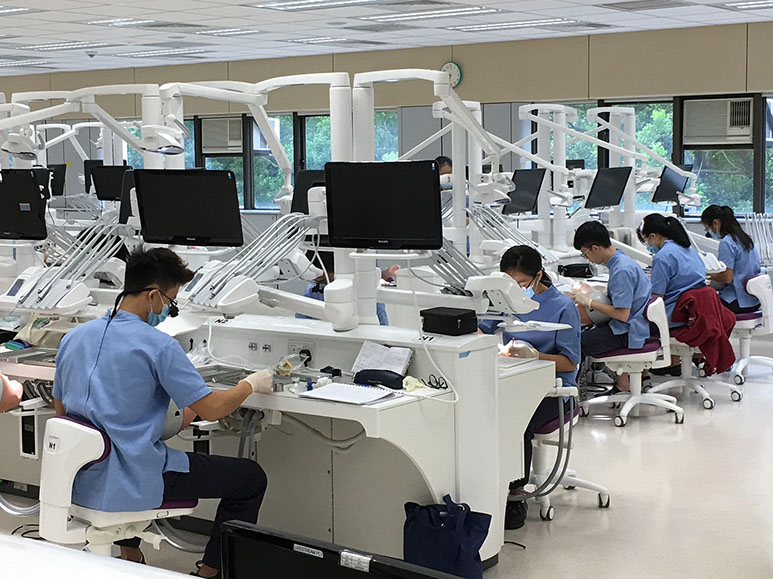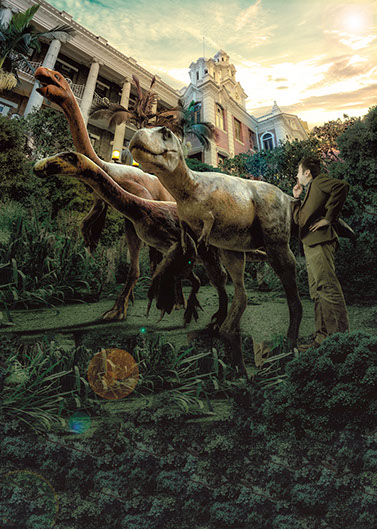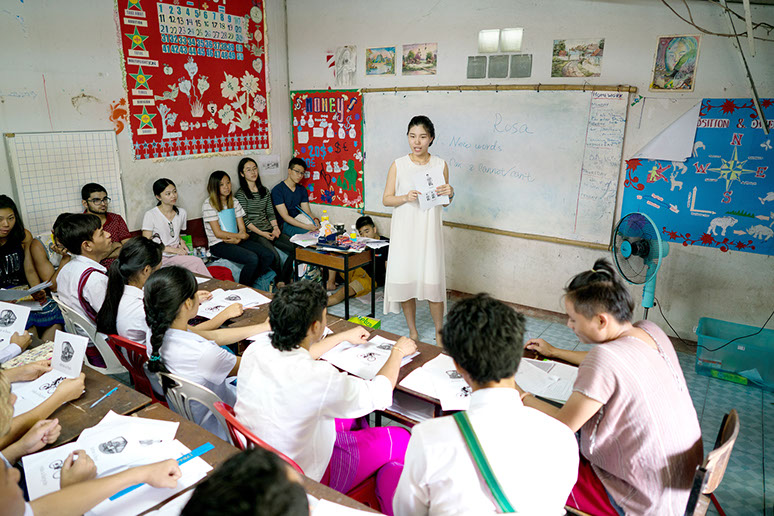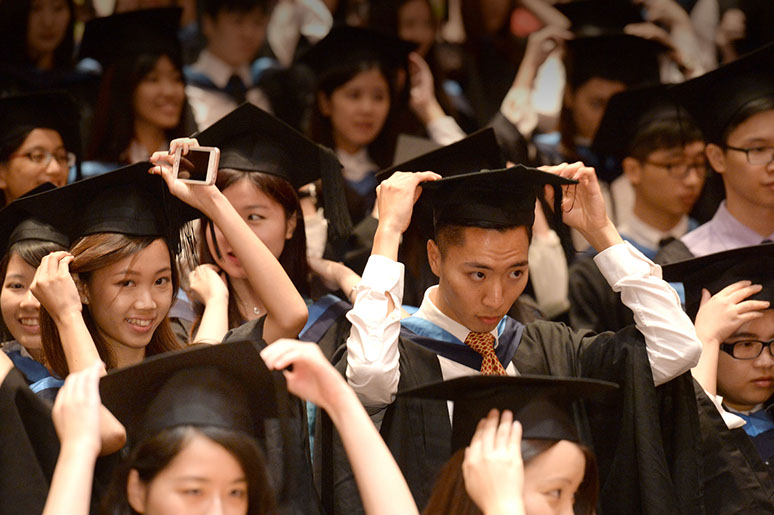Vision and Mission
Message from the
President and
Vice-Chancellor
Teaching and Learning
Research and Innovation
Knowledge Exchange and
Technology Transfer
The University Profile
An Extract from
the University’s
Annual Accounts 2016-17
Officers of the University
The Court
Vision and Mission
Message from the
President and
Vice-Chancellor
Teaching and Learning
Research and Innovation
Knowledge Exchange and
Technology Transfer
The University Profile
An Extract from
the University’s
Annual Accounts 2016-17
Officers of the University
The Court

The Review 2017

PDF Version
Past Issues
E-Book
TEACHING AND LEARNING

The Faculty of Dentistry’s newly renovated simulation laboratory provides state-of-the-art learning facilities.
HKU marked an important milestone in 2016–17 with the graduation of the first group of students under the
new four-year curriculum. In 2012 all Hong Kong universities expanded their undergraduate education from three years to four, and HKU used this rare opportunity to re-focus its aims and offerings. The balance has shifted to emphasise the needs of students over programmes, and we have been fine-tuning our offerings to ensure students get a top-flight education that also meets the University’s aspirations for internationalisation, innovation and interdisciplinarity, all converging on impact.

Taking Stock
The new curriculum is kept under constant review and in 2017 the Senate approved several important changes in light of experience. One pertains to the Common Core, which requires all students to take generally six interdisciplinary courses in four areas of inquiry: Scientific and Technological Literacy, Humanities, Global Issues, and China: Culture, State and Society. The Senate agreed to credit only the best five grades to students’ GPA in order to encourage students to take more risk when selecting Common Core courses, unless all six grades will result in a higher GPA.
A second change is that from 2018 the exemption requirement for Core University English will be lowered to 5 in the DSE from 5**,
in recognition of students’ proficiency (they must still study English in the Discipline). And a third change is that students will be allowed to gain up to six credits for co-curricular activities that will be added to the 240 credits they need to fulfil degree requirements. These six credits will become part of their e-portfolio of academic achievement, which aims to reflect the full range of academic and
non-academic learning that students engage in while at HKU.
Crossing Disciplines
The Common Core has attracted interest from around the world since it was fully launched in 2012, and we are continuing to develop its potential to promote interdisciplinary learning. The breadth of offerings – some 167 courses in 2017 – is being matched by depth with the launch of transdisciplinary minors and clusters, which were also recently approved by the Senate.
First-year students from September 2017 have an option to group their Common Core courses around one of two themes: Sustaining Cities, Cultures and the Earth; or The Universe and the Question of Meaning (more themes may be added later). Students who take all six Common Core credits under one of these themes will qualify for a transdisciplinary minor, and those who take four such credits will qualify for a transdisciplinary cluster. This will be recorded in their e-portfolio and be additional to their disciplinary majors and minors.
Innovative
The Common Core is itself innovative but the University has also been pushing boundaries in other ways, particularly in its use of technology. Spearheading this effort is the Technology-Enriched Learning Initiative (TELI), which was established in 2015 and has made great strides in the past academic year.
TELI supported the launch of eight new Massive Open Online Courses (MOOCs) through edX and Coursera in 2016–17, and launched six on-campus courses that blend MOOC-style online learning with on-campus classes (called ‘SPOCs’ for Small Private Online Courses), including a Common Core course partnered with Peking University. HKU is also leading a project funded by the University Grants Council (UGC) to produce 10 SPOCs with the Chinese University of Hong Kong, Hong Kong University of Science and Technology, and Hong Kong Polytechnic University. The content comprises general education and Common Core-type courses and will be shared among the four universities. Another collaboration is with the Mass Transit Railway Corporation, which was so impressed by the production quality of the HKU MOOC ‘Making Sense of the News’ that it has commissioned TELI to produce videos about its operations for public consumption. This kind of work will contribute to the financial sustainability of TELI, which provides free services for UGC-funded programmes.

MOOCs cover a wide range of topics, ranging from Hong Kong cinema to Dinosaur ecosystems (above).

As part of the Nurturing Global Leaders Programme, HKU students did teaching practice with local students in Mae Sot, western Thailand.
International Experience
HKU is committed to providing every student with both an international experience and a Mainland China experience by 2022 (and 50 per cent of students by 2019), to instil in them the values of global citizenship. Individual faculties have been expanding opportunities for student learning overseas, as has the University as a whole. In 2017, for instance, we organised the HKU-Common Purpose Leadership Development Programme and Nurturing Global Leaders Programme. The University also seeks external funding to support student experiences abroad and recently welcomed a pledge from the Tin Ka Ping Foundation to fund 3,000 HKU students over three years on various cultural learning activities along the ancient Silk Road.
International engagement also means welcoming non-local students to increase diversity and cultural exchange on campus.
In 2016–17, 2,095 Mainland and international students came to HKU for exchanges and other visits. We are also forging ties in areas of the world where HKU is a new partner. For example, the University provides scholarships for visiting students from African universities and in 2017 sent its first high-level delegation to Africa to promote HKU. Other international outreach includes dual degrees with institutions overseas such as Cambridge University, Sciences Po and Columbia University, and combined exchange and articulation degrees for Bachelor of Biomedical Sciences students to pursue veterinary medicine at Edinburgh University or the physiotherapy master’s programme at the University of Sydney.
The integration of non-local students on campus is also a focus of activity. The Centre of Development and Resources for Students (CEDARS), residential halls and student societies have programmes to welcome new students and introduce them to local ones, and CEDARS is also very active in providing pastoral care for all students. The fact that HKU is ranked third in the world for international outlook by Times Higher Education (in 2015, 2016 and 2017), and attracts top-performing students from Hong Kong, Mainland China and globally, is a testament to the University’s ongoing success in providing a fulfilling and enriching education that prepares students for future achievement.

Graduation Milestone
The 196th Congregation, held from November 3 to December 7, 2016, conferred degrees on 8,499 graduands, including one very special group: the first class of the new four-year curriculum.
9,000
applications
Nearly
From students in
Mainland China. 385 were admitted.
70%
of top scorers
56 of the 83 Hong Kong students who scored 5**
in 5 or more HKDSE
subjects gained admission
to HKU in 2017.
5 students scoring 5** in 7 subjects came to HKU.
90.5%
employment
For the 11th consecutive year, graduates achieved full employment
(including those pursuing further studies). The
latest figures are as of
2016.
HKU students
9,192
outbound
Students went to
Mainland China, Asia, Europe, Africa, Oceania,
and North, Central and South America.